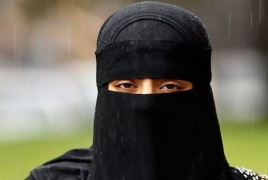
Sri Lanka will ban all face coverings including niqabs and burqas in the wake of the Easter suicide bombings that killed 253 people, it was announced last night.
President Maithripala Sirisena used emergency powers to outlaw any form of face covering in public in a bid to help police track down wanted terrorists.
It will mean Muslim women in the country will no longer be allowed to wear some religious head garments.
The niqab, which covers the whole head apart from the eyes, and the burqa, which has a thin veil across the eye opening, will be banned.
But wearers of the hijab and the chador - which leave the face exposed - will be exempt.
The new law comes into force today - a week after some MPs called for their ban.
One politician cited terrorists' use of the religious coverings to evade police by concealing their identities.
Announcing the ban, President Sirisena's office said in a statement: "The ban is to ensure national security... No one should obscure their faces to make identification difficult."
ISIS-linked jihadists set off suicide bombs at churches and hotels across the Sri Lankan capital last Easter Sunday - killing 253 people including eight Brits.
Islamic clerics urged female worshippers last week to avoid covering their faces over fears of a public backlash following the atrocities.
Muslims in the majority Buddhist nation account for about 10 per cent of its 21 million population.
A mainly liberal form of the religion is practiced by Sri Lankan muslims and only a small number of female followers wear niqabs or burqas.

